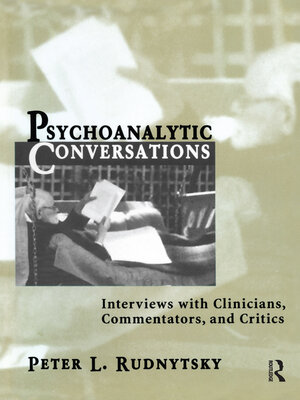Psychoanalytic Conversations
ebook ∣ Interviews with Clinicians, Commentators, and Critics
By Peter L. Rudnytsky

Sign up to save your library
With an OverDrive account, you can save your favorite libraries for at-a-glance information about availability. Find out more about OverDrive accounts.
Find this title in Libby, the library reading app by OverDrive.



Search for a digital library with this title
Title found at these libraries:
| Library Name | Distance |
|---|---|
| Loading... |
In this stunning addition to what has of late become a distinct genre of psychoanalytic literature, Peter Rudnytsky presents 10 substantive and provocative interviews with leading analysts, with theorists from allied fields, and with influential Freud critics. In conversations that Rudnytsky succeeds in making psychoanalytic both in form and in content, he guides his interlocutors to unforeseen reflections on the events and forces that shaped their lives, and on the personal and intellectual grounds of their beliefs and practices.
Rudnytsky, a ranking academic scholar of psychoanalysis and the humanities, approaches his subjects with not only a highly attuned third ear but also a remarkable grasp of theoretical, historical, and clinical issues. When his interviewees turn from autobiographical narratives to matters of theory and clinical practice, Rudnytsky is clear about his own intellectual allegiance to the Independent tradition of object relations theory and his admiration for John Bowlby and attachment theory. His willingness to set forth his own point of view and occasionally to press a line of questioning infuses his exchanges with an energy, even passion, heretofore unknown in the analytic interview literature. Rudnytsky consistently emerges as a partner, even an analytic partner, in dialogues that meld discovery with self-discovery.
To be sure, Psychoanalytic Conversations will find many clinical and scholarly readers among those who relish a good engrossing read. But it will have special appeal to students of analysis who share Rudnytsky's belief that if psychoanalysis is to remain vital in the new century, "it can only be by expanding its horizons and learning from those who have taken it to task."







